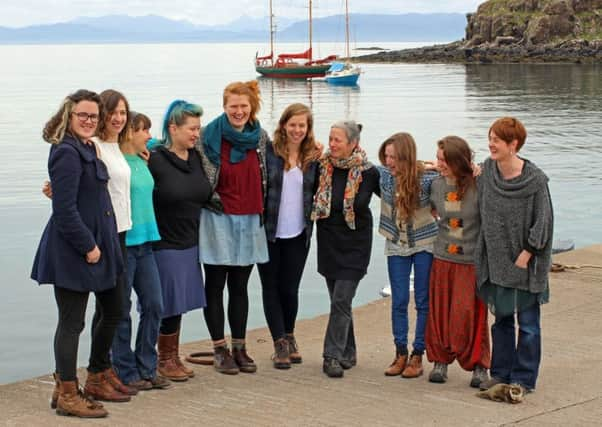The ten musicians inspired by separation who made an album on Eigg


Dominated by the blade-like crag of An Sgurr, the Isle of Eigg has seen more than its fair share of history, from vicious internecine clan warfare to the groundbreaking community land buyout of 1997, while a local legend tells of female Pictish warriors massacring a group of Christian monks there. Last summer, however, in the aftermath of the previous year’s independence referendum, the little island was invaded by a group of women with more peaceable intent, as ten Scots and English folk musicians spent a week there, making music and song inspired by the concept of separation on a political, social and personal level.
The exercise was called Songs of Separation and the resulting, eponymously titled and frequently beguiling album is launched tomorrow night at Glasgow’s Celtic Connections.
Advertisement
Hide AdAdvertisement
Hide AdThe musicians involved were singer-songwriter Karine Polwart, harpist Mary MacMaster, guitarist Jenn Butterworth and fiddlers Eliza Carthy, Kate Young and US-based Scot Hannah Read, as well as bassist Jenny Hill and Hannah James, Hazel Askew and Rowan Rheingans of the English trio Lady Maisery.
The concept was the idea of bassist Hill, who has played extensively on both the Scottish and English folk scenes, and who had spent time on the island, explains Karine Polwart, a preeminent Scottish singer songwriter who was a highly articulate Yes campaigner during the IndyRef campaign. Polwart adds, however, that there was little discussed about the actual Referendum: “There were probably quite varied opinions within the group, not so much about the values and principles that were important to us, but about what we do about them.
“So many of the musicians on the project were flitting between England and Scotland in the run-up to the Referendum. There was a strong sense of disconnect between discussions and media coverage north and south of the Border, about what the issues in play were. And last year, especially, there was just this massive global backdrop of migration and separation from home.”
Polwart points to the vast traditional song heritage of the United Kingdom and Ireland: “So much of it is concerned with loss and separation; it’s about personal grief, about exile and emigration, about the divide between the natural and the supernatural – the core material of traditional songs.
“I think Jenny realised that there were ways to reframe that material and bounce around some current ideas.”
Devised, rehearsed and recorded within a week at the home studio of Eigg-based musician Damien Halliwell, Songs of Separation opens with the distinctive rasp of a corncrake – indeed, the album is laced through with island birdsong – and Polwart, an avid birdwatcher, explains that it was seeing the picture of a corncrake on the information board on landing at the island pier that prompted her to record the haunting traditional song Echo Mocks the Corncrake. “So if I’d never read that board I would have been singing something different.”
As it was, she says, Eigg’s corncrakes proved elusive, so the one on the album is seconded from elsewhere.
Advertisement
Hide AdAdvertisement
Hide AdDecidedly of the island, however, are the vocals of two songs – one in Gaelic, one in old Shetland Norn – they recorded in a local cave.
What strikes the listener is the remarkable coherence of the arrangements, given the brief rehearsal and recording time involved – listen to the stirring accompaniment to Hannah James’s crystal clear delivery of the broadside ballad Poor Man’s Lamentation, an impassioned critique of the issues of land ownership and social inequality that still rings all too true.
“What a cracking lyric to unearth,” says Polwart. “The language is Victorian but the sentiment is exactly in the present.”
“There are a few songs like that. Some are more personal, like Hannah Read’s version of the Jacobite song It Was A’ for Oor Rightfu’ King, very much from her perspective of a Scot now living in the States.
“Several of us are interested in the whole issue of environmental degradation and separation from the natural environment,” she adds, pointing to Rowan Rheingans’ eloquent ballad of the Earth, Soil and Soul, with its questioning reprise: “What will we leave when we leave?”
The album’s penultimate track, Over the Border, is a striking reimagining of The Floo’ers o the Forest and the pipe march Blue Bonnets Over the Border, with Polwart and Carthy singing lyrics reflecting both Scottish and English perspectives, and also border issues on a wider scale: “It just spun off in an evening as a sort of jam session and the words came out of conversations about the whole refugee crisis that was kicking off at the time,” says Polwart.
Having already played a couple of gigs, they hope to play further concerts during the coming year: “The whole project has taken on more legs than anyone expected,” says Polwart, “because everyone got on really well, and it sounds like a real band, which is relatively unusual for collaborative projects.”
• Songs of Separation is at the Mitchell Theatre, Glasgow, tomorrow, as part of Celtic Connections, see www.songsofseparation.co.uk, www.celticconnections.com